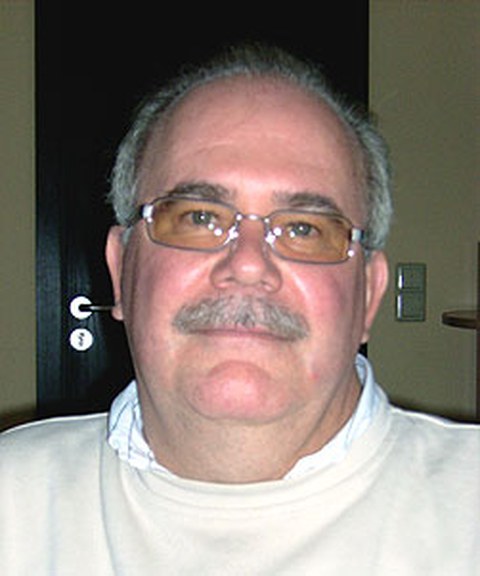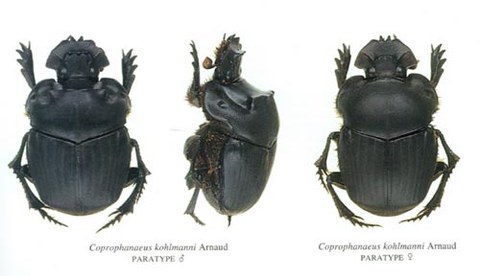A true love of insects
(Interview from 2009)
Dagmar Möbius
Biology professor Bert Kohlmann has taught at EARTH University in Costa Rica for 18 years. He is in demand worldwide as an expert. Not just on beetles – but he likes them the best.

Portrait photo of Bert Kohlmann
Kohlmann is German, but he was born in Colombia in 1957 and subsequently grew up in Mexico. At the age of 24, he came to his grandfather's home country for the first time to pursue a Diplom degree at TU Dresden after having completed a degree in biology. "When I got off the plane that day, I felt like I was returning home." He was amazed that everything was exactly as his grandparents had described. They had emigrated to Mexico in 1924 and returned to Germany in 1938, only to find a hostile political situation. "They fled back to Mexico, and had to start all over again for a second time," says Bert Kohlmann, who only knew his grandfather through stories.
Bert Kohlmann studied biology – just like his maternal grandfather. He never considered any other career. "My mother told me that, even as a baby, I would spent hours in the garden watching the ants," he recalls with a smile. His particular fondness for insects has been a constant throughout his long and illustrious career. His Diplom degree from TU Dresden on an area of ecological management promoted by UNESCO was followed by periods of research at renowned institutions around the world. Kohlmann earned a PhD in Australia in 1990, and for the past 18 years, has worked at EARTH University in San José, Costa Rica, as research director and professor. It was his best friend who was responsible for his move. "When he told me that an international university was being set up, I didn't think twice, given the poor economic situation in Mexico."

Two beetles discovered by Bert Kohlmann – one of which is pictured here – have been named after him
Fluent in Spanish, English, German, and French, he has been heavily involved in research projects conducted in partnership with NASA since the mid-1990s. One such project focuses on specific aspects of Chagas disease, which is predominantly found in Latin America and the southern United States. "This disease is dangerous because bugs infested with certain parasites can infect humans, and attack the myocardium, for example," he explains. Also known as "American trypanosomiasis," the disease kills more than 20,000 people each year in Latin America – more than die from AIDS. The World Health Organization estimates that it infects around 24,000 people every year. So far, there is no drug to cure it. "Yet the pharmaceutical industry has no interest in conducting the relevant research," Kohlmann notes. At the suggestion of the Costa Rican astronaut Dr. Franklin Chang Diaz, Kohlmann is working on trying to inhibit certain enzymes of the parasite. "If we want to find a way to inhibit enzymes, we need to see the structures in three dimensions," he explains. "To that end, they have to be crystallized, which is only possible in space." Kohlmann is also regularly called upon to interpret photographs from space – for example, to determine whether ecological conditions are changing or how cities are growing. In spring, he spoke to participants at TU Dresden's Center for International Postgraduate Studies of Environmental Management (CIPSEM) on water bioindicators, a key approach used in Latin America.

The government of Costa Rica honored the achievements of astronaut Dr. Franklin Chang Diaz and Professor Bert Kohlmann with this stamp
"The principle is simple: On the basis of small insects collected and in line with the water type, you can read from a scale how clean or how polluted the water is," he explains.
Over the past several years, he has regularly been invited to Dresden. He is particularly happy that the Frauenkirche church has been rebuilt. "I am Lutheran, and I always go to the 6 o'clock service there. When the Kreuzchor choir sings, they sound just like angels," he enthuses. He also appreciates "the scholarly pastors’ interesting sermons."
Ever since his time in Saxony, he has kept in touch with a number of his former peers and professors from Germany. He also served as advisor to a final-year student from Dresden in San José before becoming a regional ambassador for TU Dresden in the spring of 2009. Kohlmann is excited about the opportunities the role offers. "Costa Rica is a country with a lot of German culture, and that can also be attractive to German undergraduate and doctoral students."
He wishes he had more time for his research in his everyday commitments. Something he surely has in common with many professors in Germany. He dreams of studying the dung beetles of Costa Rica and compiling a monograph. There are now 190 known species. "Yes, I can tell right away if a species is new or not," laughs the beetle specialist. "I've been doing this for 20 years now." He has never gotten bored with beetles. On the contrary.
Contact details:
Bert Kohlmann, PhD
Research Director
EARTH University San José
P.O. Box 4442-1000
San José, Costa Rica
Email: Bert Kohlmann
Website: Earth University
